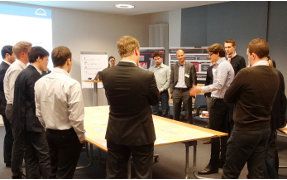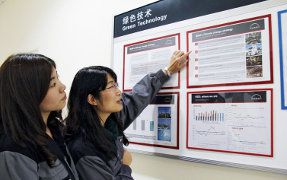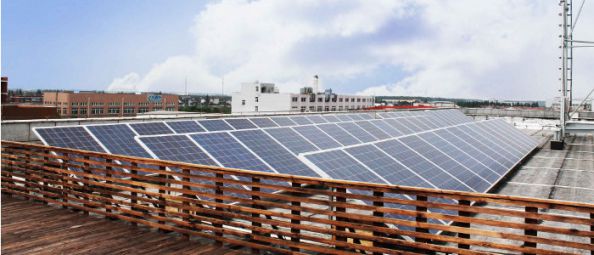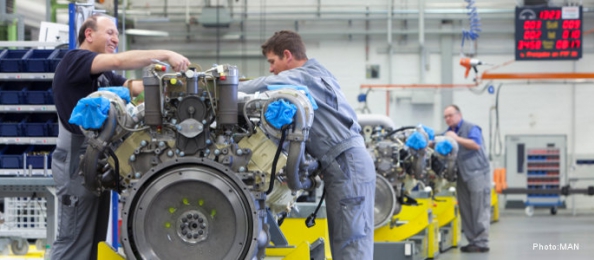MAN Lives Its Commitment to Climate Protection
As a global player in the transportation and energy sectors, MAN has a special responsibility to contribute to the reduction of the global carbon footprint. MAN lives up to this responsibility – in its Climate Strategy, it has set a clear objective: a 25 percent reduction in CO2 emissions from the company’s production sites by 2020 (baseline: 2008). The MAN Group has already cut CO2 emissions by 77,000 tons since 2008 – primarily due to the dedication and creativity of its employees, who initiate and carry out climate-protection projects at its sites.
Resource scarcity, climate change, globalization, and urbanization are global challenges. MAN actively addresses these issues through its comprehensive corporate responsibility (CR) strategy. At MAN, CR finds concrete expression in four fields of action: integration, economy, environment, and people. Integrating economic, environmental, and social responsibility into its business practices is central to MAN’s success. MAN’s employees are essential to this process – they are its CR ambassadors. Only with their participation can MAN find fitting answers to the most urgent questions of our time.
Fighting climate change
Climate change is one of the greatest challenges facing humankind – and MAN. As one of Europe’s leading manufacturers of commercial vehicles and mechanical engineering equipment, MAN has a special responsibility when it comes to protecting the climate. According to the Organisation for Economic Cooperation and Development, the transportation sector is responsible for some 15 percent of global CO2 emissions – a percentage that is rising. The energy sector presents a similar picture, with experts predicting that, by 2030, global demand will exceed current levels by more than 30 percent. MAN has a duty to contribute to a global reduction in CO2 emissions – and a business interest as well. In light of all these factors, at the end of 2011, the Management Board signed off on MAN’s Climate Strategy, a key component of the Company’s CR strategy.

Clear objectives for climate protection
MAN has more than 30 production sites in 14 countries. These facilities consume raw materials and electricity and use resources to generate energy, causing CO2 emissions. At the same time, MAN is working to continuously reduce the carbon footprints of its production sites. At the heart of MAN’s Climate Strategy
is a commitment to cutting its CO2 emissions by 25 percent worldwide by 2020 (baseline: 2008). This represents an annual decrease of 125,000 tons of carbon dioxide – equivalent to the annual emissions of a small German town with 14,000 inhabitants.
“MAN can only meet its ambitious climate target with the full support of its employees,” underscores Jochen Schumm, Chief Human Resources Officer, who is responsible for CR at MAN. “The company has to
empower them to take on responsibility in their daily activities.” That is why MAN has prioritized raising awareness of the need for climate protection among its employees. MAN aims to work together to reduce the carbon footprint of each facility and find ways to use energy more efficiently. MAN has already launched a
number of initiatives at its sites around the world to cut CO2 emissions and boost energy efficiency. The projects all have one thing in common: They actively involve MAN’s employees and thrive on their commitment.
Resource efficiency in Nuremberg
The MAN Truck & Bus plant in Nuremberg, Germany, must cut CO2 emissions by almost 28,000 tons in order to meet the Group’s climate target. Employees at the site are applying the full force of their creativity to mastering this challenge. For instance, they developed a method for cold testing engines – MAN was the
first commercial vehicle manufacturer to successfully apply the method. Not only is cold testing quick and safe, it is also better for the environment than the hot testing method that was previously used – it cuts diesel consumption by approximately one million liters per year and reduces CO2 emissions by 3,000 tons. In addition, modern test benches have allowed test runs to be shifted off the roads and into the workshop. All
traffic, weather, and load conditions can be simulated without negative environmental impacts.
Cold testing is just one of the many measures that are making the Nuremberg production site more energy efficient. The Walk of Energy sums up and illustrates the potential for production-related carbon savings at different stations. It shows employees and visitors how efficient compressed-air generation, machining centers that switch off automatically, and split-level ventilation can cut energy consumption in the production and assembly shops. Every station in the Walk of Energy has made a significant contribution toward cutting CO2 emissions, and the plant’s carbon footprint has been reduced by 10,800 tons since
2008. This means the facility is already a third of the way toward reaching its goal.

Green Office in Shanghai
At MAN Diesel & Turbo in Shanghai, China, all energy-saving measures have been bundled in the Green Office initiative. Solar panels now cover large portions of the administration building’s roof, providing some of the energy used in the offices. In addition, all light bulbs have been replaced with energy-saving bulbs. And the employees are also making an important contribution: When the office closes for the evening, one staff member on each floor goes through and makes sure all electric equipment has been switched off. A different employee is responsible each week. Not only has the Green Office initiative increased employee awareness of the responsible use of resources – it has also boosted their team spirit.
Energy Efficiency Network Changzhou
In Changzhou, China, 200 kilometers further west, MAN Diesel & Turbo is also playing its part in meeting the Groupwide climate goal. Not only has the site invested in efficient production equipment, but the employees also receive regular training in energy efficiency. An energy-saving-awareness bulletin board in the break rooms keeps employees informed about the plant’s current energy consumption. And awarding an Energy
Efficiency Star to particularly successful energy savers provides additional motivation. MAN Diesel & Turbo is sharing the best practices from this site with others; in 2010 it joined forces with 12 other companies in the region to form the Energy Efficiency Network Changzhou. This corporate network offers a unique platform for exchanging information, learning from one another, and developing efficiency-boosting ideas. The Energy Efficiency Network Changzhou has already identified a remarkable 98 ideas for saving energy.

Climate-friendly training center in Holeby
In Denmark, MAN Diesel & Turbo’s PrimeServ Academy in Holeby serves as a shining example of climate-friendly facility design. In 2013 the insulation, heating, and lighting at the Holeby training center were optimized for energy efficiency. The goal was to minimize heating and electricity costs. The savings are not just a win for the climate, but for the company’s bottom line as well.
“Manage responsibly” in Munich
Managers are important multipliers who raise awareness about corporate responsibility and climate protection within the company. To this end MAN Truck & Bus launched its “Manage responsibly” program in 2012, providing managers with comprehensive training on climate and sustainability issues. This puts the managers in a position to understand all aspects of corporate responsibility, to set themselves goals, and to motivate their teams to work to improve climate protection. Almost 300 employees have already attended the training course. But managers are not the only key target group when it comes to raising CR
awareness at MAN – young talents are important too. With this in mind, in 2013 the “Manage responsibly” program was integrated into the MAN Truck & Bus trainee program as well.
CO2 cut by 77,000 tons
Managers are important multipliers who raise awareness about corporate responsibility and climate protection within the company. To this end MAN Truck & Bus launched its “Manage responsibly” program in 2012, providing managers with comprehensive training on climate and sustainability issues. This puts the managers in a position to understand all aspects of corporate responsibility, to set themselves goals, and to motivate their teams to work to improve climate protection. Almost 300 employees have already attended the training course. But managers are not the only key target group when it comes to raising CR
awareness at MAN – young talents are important too. With this in mind, in 2013 the “Manage responsibly” program was integrated into the MAN Truck & Bus trainee program as well.
| Initiator | MAN |
| Project start | 2008 |
| Status | ongoing |
| Region | worldwide |
| Contact person | Yvonne Benkert |
| Awards | - |
Project benefit
- Increasing energy efficiency through new technologies
| Anti-Corruption | - |
| Business & Peace | - |
| Development | - |
| Environment | X |
| Financial Markets | - |
| Implementing UNGC Principles in your Corporate CSR Management | - |
| Human Rights | - |
| Labour Standards | - |
| Local Networks | - |
| Advocacy of global issues | X |
| Business opportunities in low income communities/countries | - |
| Project funding | - |
| Provision of goods | - |
| Provision of services/personal | - |
| Standards and guidelines development | - |
Yvonne Benkert is Head of Corporate Responsibility at MAN SE.
The MAN Group is one of Europe's leading manufacturers of commercial vehicles, engines and mechanical engineering equipment with annual revenue of approximately €16.5 billion and around 52.500 employees worldwide. MAN supplies trucks, buses, diesel engines and turbomachinery as well as turnkey power plants. MAN’s divisions hold leading positions in their respective markets. Munich-based MAN SE is one of the 30 leading companies in Germany's DAX equity index.
The MAN Group's strategy aims to create sustainable value in Commercial Vehicles and Power Engineering, its fast-growing business areas. The Industrial Governance management system is a part of this. It clearly distributes roles, centralizing the company's strategic management and strengthening the operational responsibility of its three subgroups: MAN Truck & Bus, MAN Diesel & Turbo and MAN Latin America. Each division must measure itself against its strongest competitor.
The MAN Group's Guiding Principles outline the scope for the responsible and sustainability-driven conduct of all MAN employees. Our Corporate Values of being reliable, innovative, dynamic and open play a key role in our success on both product markets and the capital markets as well as in attracting qualified employees and in social acceptance of all our business activities.
MAN has been around for over 250 years.
Write a comment about this page
Your comments are provided by your own free will and you take sole responsibility for any direct or indirect liability. In order to maintain the highest discussion quality, all comments will be reviewed by our editors. You hereby provide us with an irrevocable, unlimited, and global license for no consideration to use, reuse, delete or publish comments in accordance with our Community Guidelines.
0 Comments
About Us // Privacy Policy // Copyright Information // Legal Disclaimer // Contact
Copyright © 2012-2018 macondo publishing GmbH. All rights reserved.
The CSR Academy is an independent learning platform of the macondo publishing group.









